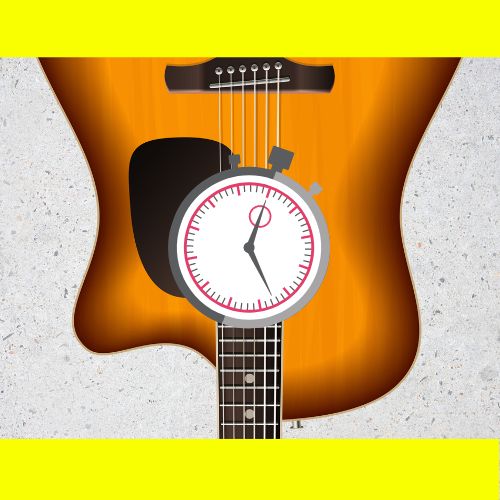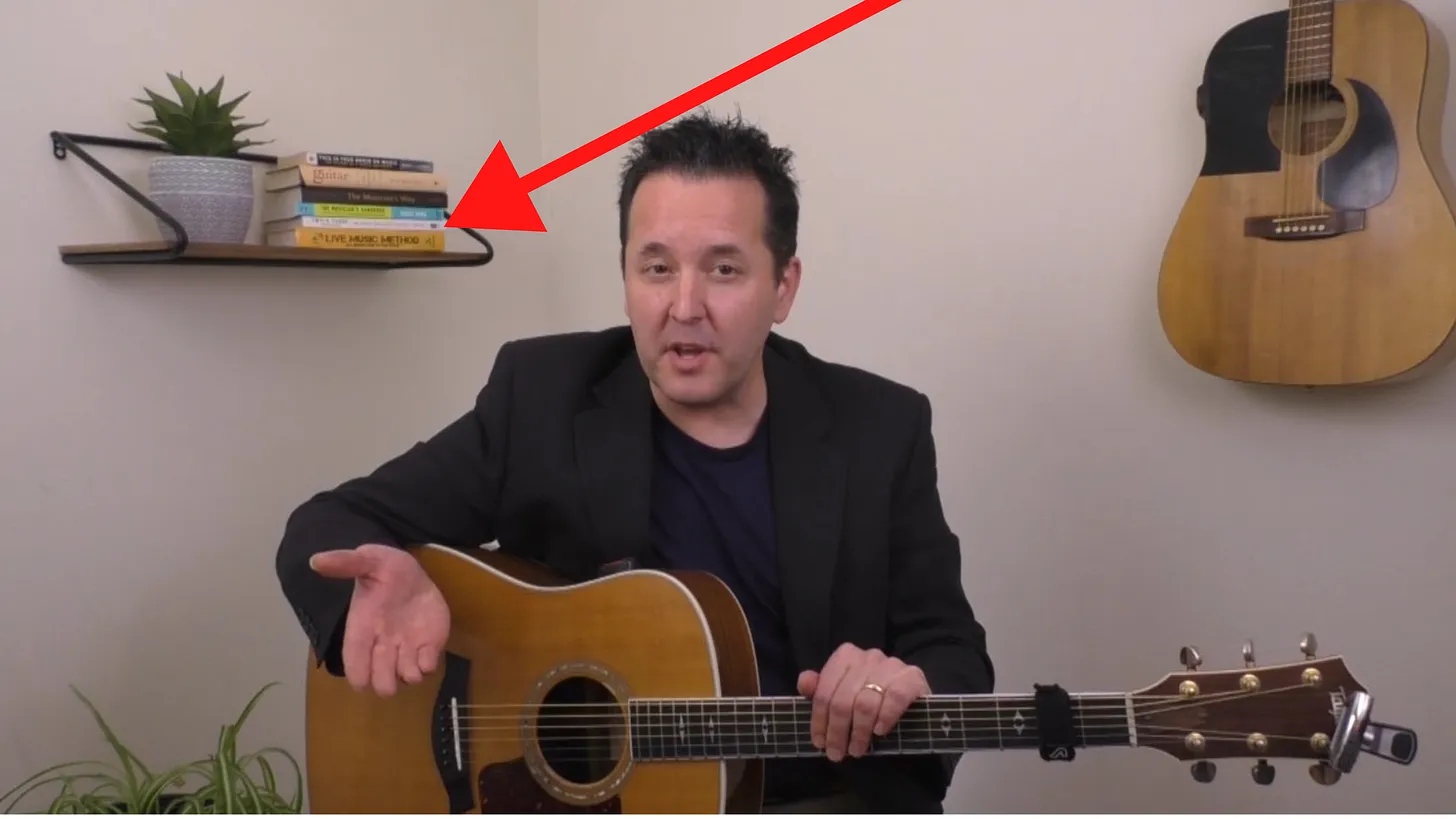
The Guitarist We Should All Surpass
August 02, 2023
My eldest daughter recently returned from her first international adventure.
She went on a special trip with some of her schoolmates to England, Scotland and France. While in England, she had the privilege of visiting The Kilns, a beautiful house in Risinghurst, Oxford.
When she got home, she shared with me how profound of an impact this experience had on her.
Why is this house significant? It was the home of author C.S. Lewis, who blessed us with a host of literary works, including the Chronicles of Narnia.
Upstairs in the house is the wardrobe that inspired those amazing books.
C.S. Lewis has had a profound impact on me as well, through his writings and quotes. In my opinion, one of his most powerful quotes comes from The Weight of Glory, in the “Learning in War Time” segment he crafted during World War II.
Lewis said this:
“If we let ourselves, we shall always be waiting for some distraction or other to end before we can really get down to our work. The only people who achieve much are those who want knowledge so badly that they seek it while the conditions are still unfavorable. Favorable conditions never come.”
That’ll preach.
I can fall prey to procrastination, and can self-sabotage by waiting for favorable conditions, especially with my musical development and progress.
But I don’t have to.
None (or some) of the following are real quotes I’ve heard or spoken, but they should give you an idea of what “favorable conditions” might look like, and how the “perfect” scenario can be a little elusive.
“I’ll practice when I’ve got more time.”
“I’ll play my guitar when I can make an actual physical space to practice.”
“I’ll write songs when I have less going on.”
“I’ll audition for the worship team when I’m a bit more polished.”
“I’ll make plans to collaborate with a fellow musician when school is out.”
“I’ll develop my creative and practicing routine when school is back in session.”
“I’ll get my guitar tuned up at the shop when I have a bit more flexibility in my schedule, or some more financial resources.”
“I’ll learn to play the guitar when my life is a bit less hectic.”
Do any of these sound familiar?
Perhaps the best way to combat these, well, potential “excuses” is to meet them head-on and to have an intentional, gentle debate with them, to see how legit they really are.
Let’s do this here and now, and I’ll walk you through my approach to each of these.
If the statement is “I’ll practice when I’ve got more time,” could something be done to make the time?
What could be moved around so that more time could be available?
If we want to set aside two hours every day for practice, that could rock our schedule paradigm pretty hard.
But what about 10 or 15 minutes? Is there a specific time of day where that modest segment of practice could happen?
Consistency trumps intensity, right?
Maybe a short practice session could happen in the morning before everyone else in the house is awake, or in the evening when they’re asleep. Maybe on a lunch break.
But setting aside that time, and committing to it (even deciding the night before that it’s going to happen) will help us overcome the hurdle of reluctance, when willpower wanes.
We can say to ourselves, “I’ve already decided to do this, so I’m going to follow through and do it.”
By way of a parallel illustration, we all need to eat, right? I don’t picture myself saying, “I’ll eat meals when I have more time.” That wouldn’t make sense, would it?
Music can be nourishing to us in some ways that food cannot, and if we don’t play it very often, we can grow hungry and feel starved for that rich part of life that we know can bless us. So, let’s see if we can prioritize just a small segment of consistent time.
What about “I’ll play my guitar when I can make an actual physical space to practice.”?
In a pinch, virtually any space can become a temporary practice space.
I have found some unique, unusual places to practice my guitar (a college hallway, a moving vehicle while wearing a seatbelt, the bow of a boat, a dock, a picnic table, and more.)
None of these were really “favorable conditions,” but I made do, and I made progress.
I will say that having a space set aside that’s inviting and cozy can really make practicing more creative. We talk about this in one of the bonuses I give my members of GuitarSuccess4U as soon as they join. It’s called “10 Tips for Making Your Solo Practice Space Great.”
But even without a permanent space, we can still make space to get some practicing done.
If the statement is “I’ll write songs when I have less going on,” well, when might there be less going on?
Some of my best songs emerged in a very full season of life. And some songs are born out of stressful or emotional seasons. If I had waited for the emotions to subside, the fodder for my creativity might not have been as fresh.
This is a question that could be expanded upon in an entire episode, but can creativity be scheduled?
In her book “The Creative Habit,” Twyla Tharp absolutely argues in favor of this. I love that book. In my GuitarSuccess4U lessons, you can see her book winking at you from my bookshelf just to your left as I teach.

Cultivating the creative habit could be one of the best habits you develop, in any season of life.
What about, “I’ll audition for the worship team when I’m a bit more polished”?
Well, yes, worship directors want their members to be practiced and playing well, but there may come a time when someone just needs to step forward and audition, if only to get a little feedback.
And even if the answer from that worship director is “Not yet,” the guitarist auditioning can gain some insights for what they can work on.
Better to know more at this point about what’s needed, so as to be able to spend the next three to six months working intentionally on what will serve them and the team better, be it rhythm, clean chords, dynamics, or whatever’s needed.
Skill is something that can always be developed, and if we wait until we’re “perfect” at something, we may be waiting an awfully long time.
Next up is, “I’ll make plans to collaborate with a fellow musician when school is out.”
Yes, school can be a pretty jam-packed season. Take it from someone who has sat with his kids for countless hours working through math, vocabulary, and quizzing them in preparation for exams. I get it. School is busy.
But so is summer.
I watch in awe as our summers get filled with lots of (good) activities that can sometimes give us less margin for the other things we’ve wanted to do.
Sometimes just setting aside time on the calendar can be the best measure of being proactive.
This includes reaching out to a fellow musician and saying, “Hey, let’s take time a week from Saturday from 1 to 4 p.m. for a creative musical session, whether jamming, co-writing, or just enjoying playing through some songs we both know.”
Because if we don’t make time in the summer to do the things we long to do with guitar and music, we’ll fall prey to believing this next statement…
“I’ll develop my creative and practicing routine when school is back in session.”
And then we’re busy with school, hoping for another opportunity next summer.
Yes, it can be a bit of a circle. Not a vicious one, but a predictable one.
But school does offer a routine.
And a routine can be a great framework to latch habits onto, including creativity and practice, both of which I’ve mentioned. With care and intention, the creative routine and/or the practice routine can be brought alongside the school routine.
Maybe you have flexibility in your day to where the kids are at school and you can do some of your music. Or maybe after you’ve welcomed them home, as they get settled into their afternoon homework, you can grab your guitar.
Or maybe you’re the student, and you’ve had a full day of classes. The guitar can still call out to you from your practice space and invite you to use a different part of your brain for a few minutes before you get down to studying, or even as a study break. I did this more times in college than I can count.
There are windows of time where we can build our dreams even during the busy-ness of the school year. They might not be “favorable conditions,” but they can still happen.
Next, we have “I’ll get my guitar tuned up at the shop when I have a bit more flexibility in my schedule, or some more financial resources.”
Postponing guitar repair is something I’ve seen many people do. We can often hobble along on a guitar that “sort of” works well, but we can be foregoing a better situation.
Now, it can be expensive to repair certain guitars. But where I take my instruments at Mike Lull’s Guitar Works, they evaluate and provide an estimate, free of charge, so I at least know what I’m in for, and then I can budget or save for it.
But imagine if you had high string action, for example, and all it took was a new nut, saddle, or even a truss rod adjustment to change the game and give you the playability you longed for.
It could make all the difference in the world. So, dropping off your guitar at a shop you trust, and having them evaluate it, perhaps on your lunch break, could be worth less than an hour of your time to invest.
Waiting to do this could lead to low morale, because the instrument is going to be less responsive, and then…you guessed it…less motivation for practice or even creative expression.
Finally, for your consideration, “I’ll learn to play the guitar when my life is a bit less hectic.”
Some of the busiest people I know can still find time for their music. You’ve heard the saying, “If you want to get it done, give it to a busy person, and they’ll make the time to do it.”
There’s a lot of truth in that.
The reality is that we each have “life.” Stuff we want to do, stuff we need to do. And we make time and prioritize those things that are important to us.
There is a beautiful dance that goes on in the life of a parent, because they have work, leisure, and they’re constantly speaking into the lives of their kids. It’s a great privilege. And it can be tiring in a good way as well.
When I was growing up, my mom had a framed saying on the wall that said “Trying to keep house while children are growing is like shoveling the snow while it’s still snowing.”
Right?
But here’s the thing. We need to shovel the sidewalks, whether it’s snowing or not. And maybe we get the reward of a day or an afternoon where our sidewalks are pristine and have no snow on them.
But that’s not real life. So more than likely, we’ll need to shovel them again. Soon. And we’ll need to keep house, and chase our kids around, and help them with their homework, and make dinner, and do dishes, and all the things that come with life.
We all have to be realistic with what we ask of ourselves, but with the beauty of music and the deep calling many of us are walking in, sometimes we need to wade in and face those “unfavorable conditions.”
When we do, we discover the joy of learning and progress that’s waiting on the other side.
So, which “favorable conditions” are you waiting for, and what can you do now to seek knowledge (especially with guitar and music) even though those conditions aren’t present yet?
If you’re looking for a tangible solution, I’ve got one for you. And you may have heard me talk about it.
It’s called GuitarSuccess4U.
Suffice it to say, it’s a game-changing, unique and accessible approach to learning the guitar, for beginning and intermediate Christian guitar players who need the flexibility to pursue their definition of success at their own pace, from the comfort of home.
We’ve poured thousands of hours and decades of experience into something that will save you time, and more importantly, discover the joy of music as you fill in all kinds of gaps that lead to musical artistry.
And we’ve factored in the idea that favorable conditions aren’t realistic.
What’s really cool is that for each lesson, we provide a video version (that can be sped up if you’d like), as well as an audio version, and even a transcript that you can read along with or skim through. Many of the lessons also have full-color worksheets.
Can you see how we’re working to make conditions more favorable for your guitar development?
And if you’re wondering what the financial commitment is, currently the monthly tuition for beginners is $29 a month. That’s it. That’s like 95 cents a day. Compare that to a month of professional lessons of this caliber at about $300, and we’re talking about an incredible value.
Intermediate members pay annually for all access, and their tuition is $297 a year, which amounts to 81 cents a day.
This means that intermediate students have a full year of access to incredible content for less than the price of a month of lessons.
Yeah buddy.
I will say this – no matter what kind of guitar learning experience may be out there, no matter how awesome or affordable, it’s not going to work for someone who signs up for it, but doesn’t utilize it. Right?
This applies to any endeavor – we’ve got to take some time to dig into what’s available.
I can’t say enough about GuitarSuccess4U. I’ll let you check it out for yourself.
Well, I hope today’s discussion was fruitful and encouraging for you, and maybe it helped dismantle some of the apparent barriers to your guitar progress.
I still stand by what C.S. Lewis said: “Favorable conditions never come.” But I love what he said just before that statement: “The only people who achieve much are those who want knowledge so badly that they seek it while the conditions are still unfavorable.”
How badly do you want guitar knowledge? Badly enough to seek it while conditions are still unfavorable?
I sincerely, truly hope so.
And I hope you desire to seek guitar knowledge with me and our tribe of eager guitar learners who love Jesus. You’ve come this far. Maybe you’ll take the road to GuitarSuccess4U that has opened before you here. I can’t wait to see what’s next.
ABOUT ME
David Harsh
Singer, Guitarist, Teacher
Welcome to a blog designed to enhance your guitar journey as you offer your gifts to the Lord.

© 2023 GuitarSuccess4U a ministry of David Harsh Ministries.



